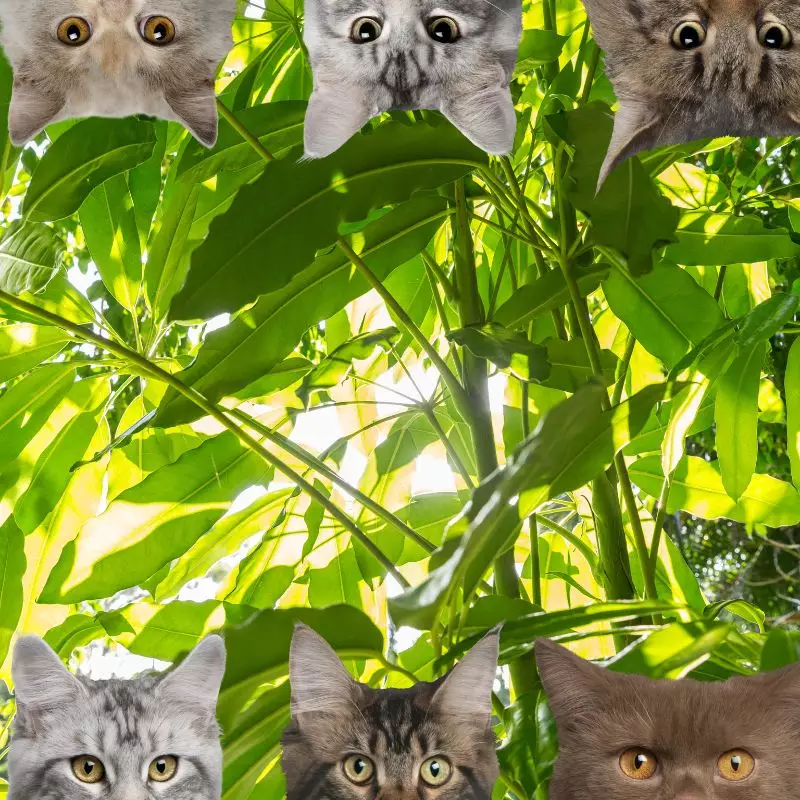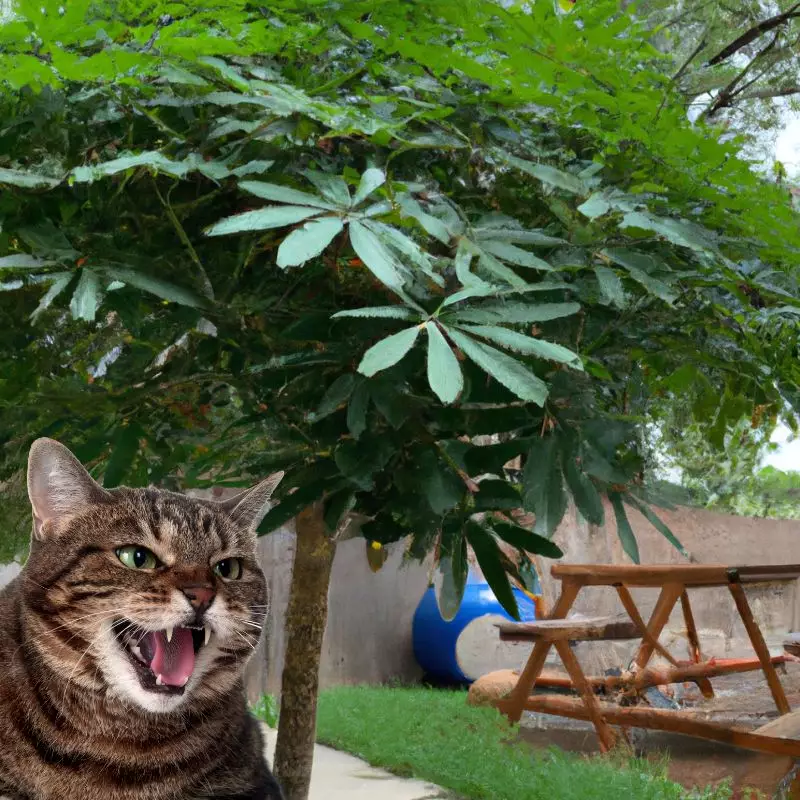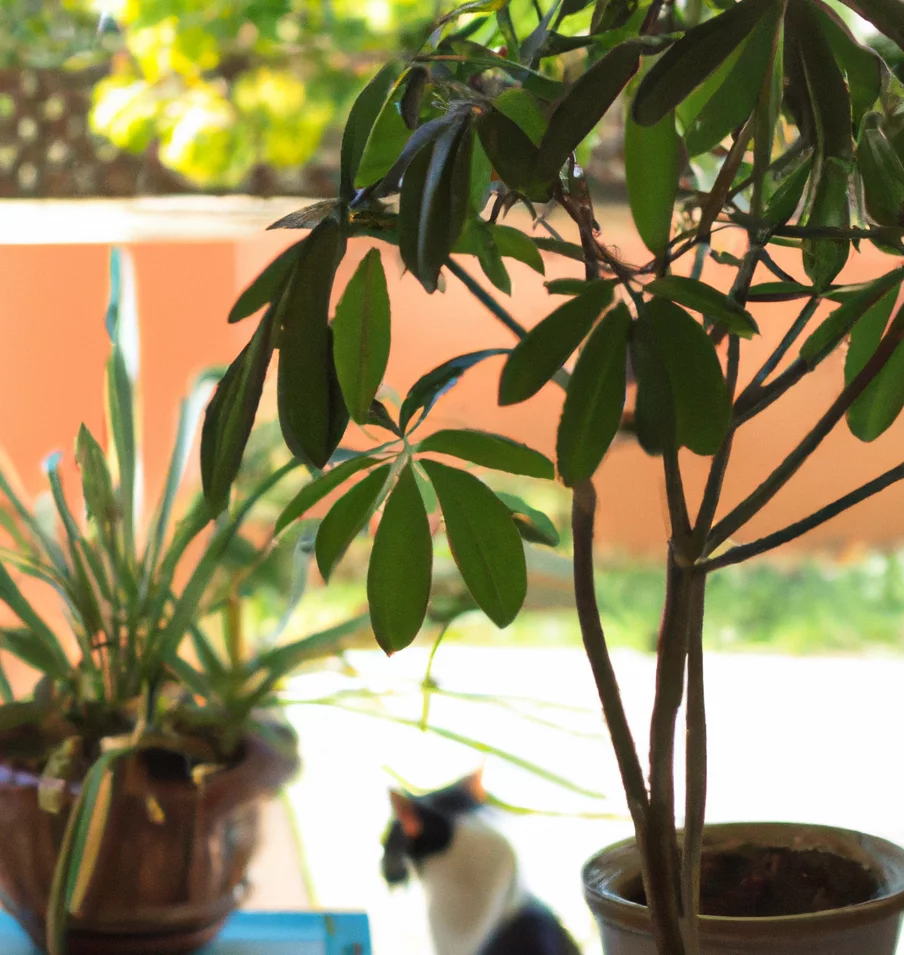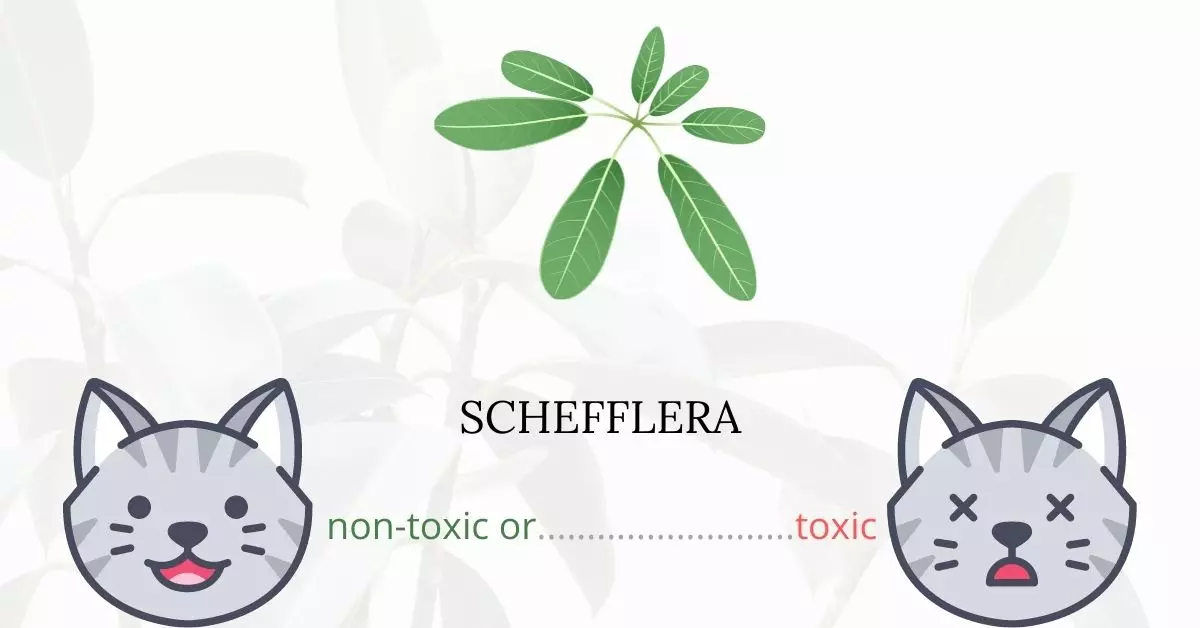Absolutely, Schefflera plants are indeed toxic to cats. They contain harmful substances present in various parts of the plant, notably the leaves, with some species harboring toxins throughout the entire plant from the roots up. Calcium oxalate crystals are the primary toxic principles within Schefflera plants, causing severe distress and pain in cats upon ingestion.
This article is meticulously penned down in collaboration with a group of seasoned Doctors of Veterinary Medicine (DVMs). Their extensive knowledge and expertise empower us to furnish accurate, reliable, and the latest information about the risks posed by different plants, particularly Schefflera, and their implications on feline health. Moreover, our comprehensive research is supplemented by information sourced from high-authority websites, including ASPCA and PetMD, to ensure the provision of the most credible and updated content on every plant discussed.
When a cat consumes any part of a Schefflera plant, the idioblast cells within the plant are broken down by the cat’s saliva, releasing the raphides—needle-shaped calcium oxalate crystals—into the feline’s mouth. These raphides can erupt forcefully from the idioblast cells, piercing through the tissues in the cat’s mouth, tongue, throat, and upper digestive system. This penetration by millions of tiny needles can cause immediate and severe discomfort, swelling, and pain to the cat, making Schefflera a plant to be kept well out of reach of our feline companions.
Clinical Signs of Schefflera Poisoning in Cats

When a cat is exposed to a Schefflera plant, whether through contact, inhalation, or ingestion, several clinical signs indicate Schefflera poisoning. The onset of these symptoms can be immediate or might appear up to two hours post-exposure.
Immediate Signs:
- Oral Inflammation: Contact with Schefflera’s toxic components triggers inflammation in the cat’s mouth. The mucous membranes become red and swollen due to the body’s inflammatory response to the penetrating calcium oxalate crystals.
- Acute Burning and Irritation of Mouth, Lips, and Tongue: The calcium oxalate crystals cause immediate and intense burning and irritation as they embed themselves into the soft tissues, leading to significant discomfort.
- Profuse Drooling: The intense irritation and burning sensation in the mouth lead to excessive salivation as the body’s natural response to soothe and flush out the irritants.
- Vomiting: The ingested toxins can irritate the gastrointestinal tract, leading to vomiting as the body attempts to expel the harmful substances.
- Swallowing Problems: The embedded crystals in the mouth and throat tissues can cause pain and swelling, leading to difficulty in swallowing.
Advanced Signs:
If a cat consumes a larger quantity of the Schefflera plant, or if initial exposure signs are left untreated, more severe clinical signs may manifest, including:
- Fast Breathing or Dyspnea: The distress and pain can cause elevated stress levels, leading to increased respiratory rates or even difficulty in breathing.
- Digestive Problems: Continuous ingestion or prolonged exposure can further irritate the gastrointestinal system, causing persistent vomiting and diarrhea.
- Renal Failure: The toxins, if absorbed systemically, can cause severe damage to the kidneys, impairing their function and potentially leading to renal failure.
- Convulsions: The systemic absorption of toxins can lead to neurological manifestations like seizures due to the impact on the cat’s central nervous system.
- Coma and Death: In severe cases of poisoning, where a large amount of the plant is consumed or when timely medical intervention is not provided, the cat may fall into a coma and could potentially succumb to the toxic effects of the Schefflera plant.
Each of these signs is a manifestation of the body’s reaction to the harmful components of the Schefflera plant, and immediate veterinary intervention is crucial to manage the symptoms and prevent further complications.
First Aid and Treatment of Schefflera Poisoning in Cats

The veterinarian may prescribe vomiting medicine or give the feline an activated charcoal solution to bond with the deadly plant component, which will then be passed from the body in fecal form. To further remove the Schefflera toxin and reduce the progression of renal failure, your veterinarian will most likely begin your cat on IV fluids to refill lost fluids and help in the removal of the toxin.
Recovery from Schefflera Poisoning in Cats

The prognosis for severe Schefflera poisoning in cats is bleak since felines who survive frequently suffer from lifelong renal and liver damage. Only urgent veterinary care can provide a favourable prognosis.
For mild cases, cats usually recover within 24 to 48 hours after treatment.
Prevention of Schefflera Poisoning in Cats
While Schefflera is a nice addition to your indoor gardens, it is best to completely avoid growing this plant in your homes. Keeping your cats busy and mentally stimulated indoors will also minimize the risk of straying away far from your home and getting in contact with Schefflera or other poisonous plants.
If you love plants but have cats at home, check out these lists:





